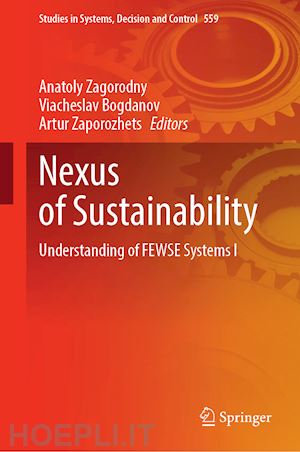
Questo prodotto usufruisce delle SPEDIZIONI GRATIS
selezionando l'opzione Corriere Veloce in fase di ordine.
Pagabile anche con Carta della cultura giovani e del merito, 18App Bonus Cultura e Carta del Docente
The intricate interplay between food, energy, water, societal dynamics, and the environment constitutes the bedrock of contemporary global challenges. In recent decades, this convergence has emerged as a focal point for scientific inquiry, policy formulation, and societal discourse. This book seeks to meticulously unravel the complexities inherent in this nexus, shedding profound light on the interconnected risks, vulnerabilities, and transformative opportunities that define our quest for sustainability in the twenty-first century. The materials of this book were prepared mainly by authors working on the joint project between the International Institute for Applied Systems Analysis (IIASA) and the National Academy of Sciences (NAS) of Ukraine “Integrated robust modeling and management of food-energy-water-land use nexus for sustainable development”, and on the project “Comprehensive analysis of robust preventive and adaptive measures of food, energy, water, and social management in the context of systemic risks and consequences of COVID-19” (0122U000552) of the NAS of Ukraine. Members of the System Analysis Committee of the NAS of Ukraine were also involved in the preparation of book chapters. The authors dedicate this book to the memory of the Academician of NAS of Ukraine, Professor Yuri Ermoliev, who died in October 2022 and made a fundamental contribution to stochastic optimization as a basic tool for quantitative risk management. This book largely follows his ideas about risk management and its applications.
1. Modeling for Managing Food-Energy-Water-Social-Environmental – NEXUS Security: Novel systems’ analysis approaches.- 2. Mathematical Modeling of Interconnections between Ecological, Food, and Economic Dimensions of Security.- 3. Models of Group Decisions and Their Applications.- 4. Constrained Recursive Kernel Density/Regression Estimation by Stochastic Quasi-Gradient Methods.- 5. Energy System Optimization Potential with Consideration of Technological Limitations.











Il sito utilizza cookie ed altri strumenti di tracciamento che raccolgono informazioni dal dispositivo dell’utente. Oltre ai cookie tecnici ed analitici aggregati, strettamente necessari per il funzionamento di questo sito web, previo consenso dell’utente possono essere installati cookie di profilazione e marketing e cookie dei social media. Cliccando su “Accetto tutti i cookie” saranno attivate tutte le categorie di cookie. Per accettare solo deterninate categorie di cookie, cliccare invece su “Impostazioni cookie”. Chiudendo il banner o continuando a navigare saranno installati solo cookie tecnici. Per maggiori dettagli, consultare la Cookie Policy.